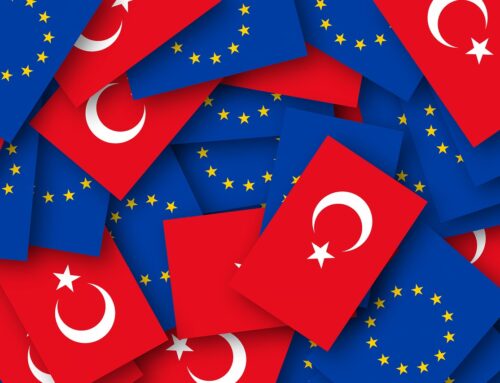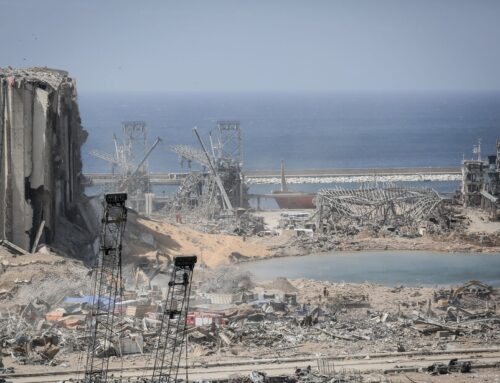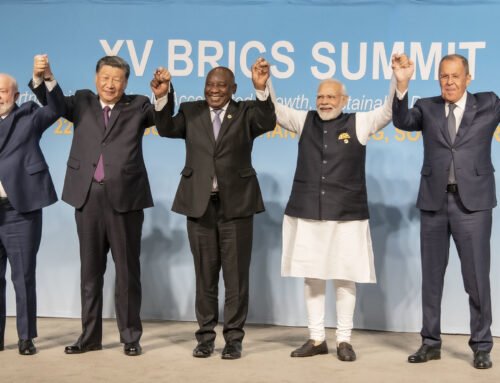Erdogan stage
Autor foto: Domena publiczna
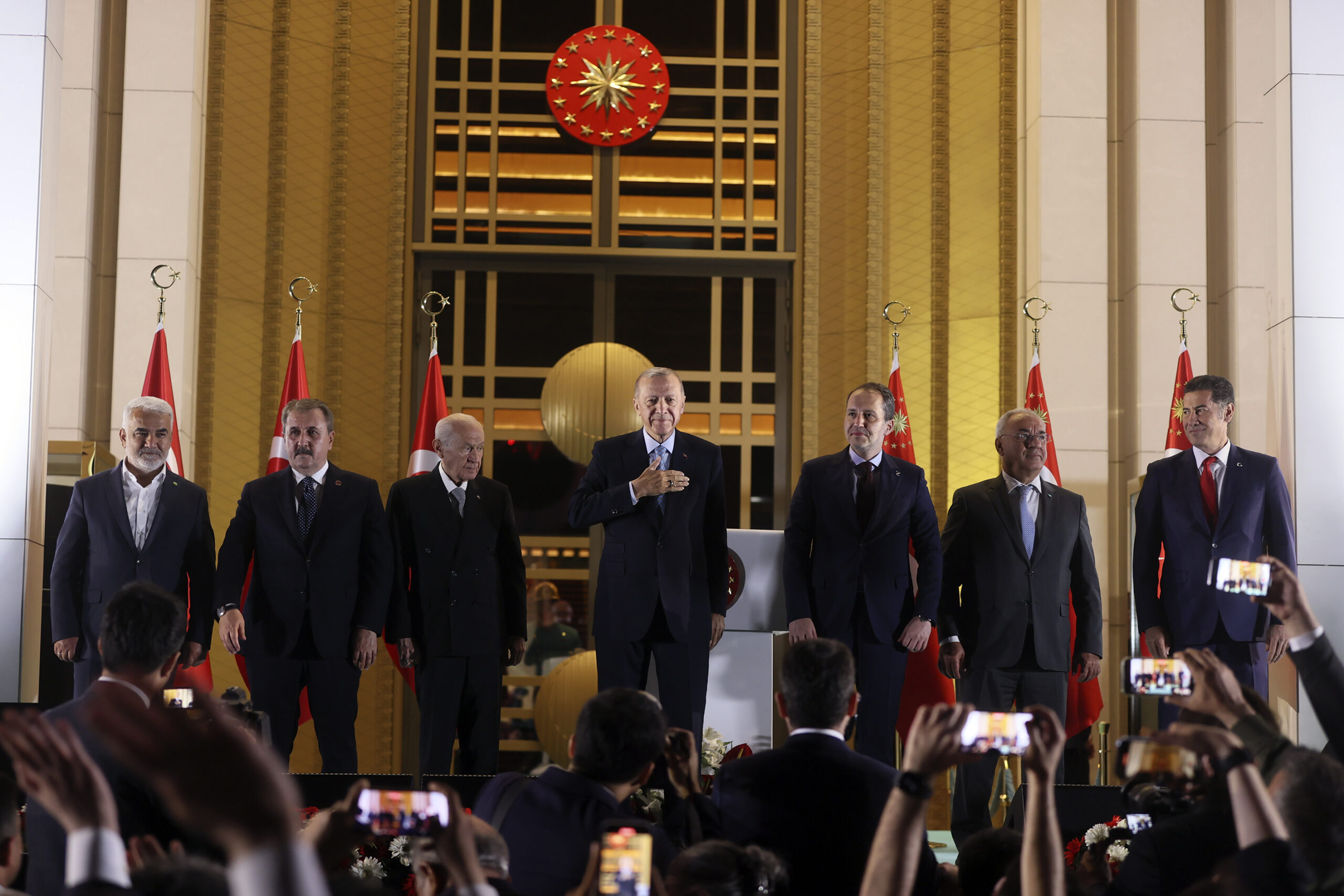
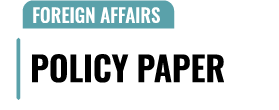

Erdogan stage
Autor foto: Domena publiczna
Reelection of Recep Tayyip Erdogan and its implications
Autor: Witold Repetowicz
Opublikowano: 7 czerwca, 2023
Pulaski Policy Paper no 26, June 7, 2023
On May 28th Recep Tayyip Erdogan was reelected as the president of Turkey in the second round of Turkish presidential elections. His rival, leader of the main opposition party Cumhuriyet Halk Partisi or Republican People’s Party (CHP), Kemal Kilicdaroglu, received 47,82 %, while the incumbent got 52,18 %. In the first round, on May 14th, Erdogan missed just less then 0,5 % to be elected, while the third place went to ultranationalist candidate Sinan Ogan (5,17 %), who afterwards gave his support to Erdogan. Therefore, such a result of second round came as no surprise, while results of the first round were met with much disappointment in the prodemocratic circles. However, Erdogan’s win was generally expected, despite most opinion polls favouring Kilicdaroglu, as it is widely known that public opinion researches in Turkey have limited reliability. Still, it was surprising in this sense that the economic and political situation of Turkey is disastrous. Turnover was just slightly higher than in 2018 with 87 % of eligible voters going to the polls in the first round and 84 % in the runoff.
Simultaneously parliamentary elections were also held in which ruling Adalet ve Kalkinma Partisi or Justice and Development Party (AKP) received 35,6 %, while its ally, far-right ultranationalist Milliyetci Harekat Partisi or Nationalist Movement Party got another 10 %, and minor ally Yeniden Refah Partisi or New Welfare Party (YRP) received 2,8 %, with respectively 268, 50 and 5 seats in 600 seats General Assembly. It is yet worth to add that among 268 AKP seats, there are 4 deputies from Kurdish Islamist Hur Dava Partisi or Free Cause Party (Huda Par). All together the ruling People’s Alliance maintained its majority in the parliament but lost 21 seats and its support dropped by 4 pp, while AKP itself lost 31 seats and its support dropped by 7 pp. The main opposition coalition that is the Republican Alliance, comprised of CHP and nationalist iYi Parti or Good Party (iYi), got 35 % and 212 seats, with 25 % and 169 seats (23 more than in 2018) for CHP and 10 % and 43 seats for iYi. The third coalition, leftist-pro-kurdish Labour and Freedom Alliance, based mainly on the candidates of Halklarin Demokratik Partisi or People’s Democratic Party (HDP), got 10,5 % and 65 seats. HDP couldn’t participate in the elections as it was threatened with a ban, but compared to its result in last elections it lost 1,2 pp and 2 seats.
At first glance it could seem as if opposition, precisely CHP, generally gained support but it is not important. First of all, in Turkish super-presidential system almost all the power is in president’s hands. The fact that Erdogan won with a very narrow margin and the elections have showed how deeply divided and polarized Turkish society is, will have completely no impact on Erdogan’s autocratic conduct and one can’t expect that there would be any gestures of goodwill towards opposition. Second, the new parliament is in fact much more radical-Islamist and far-right ultranationalist. Pro-Erdogan MHP is in fact a fascist party and has a militant wing, active also among Turkish diaspora in Europe, called Bozkurtlar or Gray Wolves, which is widely considered as a terrorist group. Opposition iYi is pro-European but would have been considered as far-right in most of European countries. Pro-Erdogan YRP represents a radical Islamist movement called Milli Gorus, which was persecuted in Turkey before Erdogan came into power. In Germany, where it is also very active, it is under surveillance of the Federal Office for the Protection of the Constitution as it is considered extremist, anti-democratic, pro-sharia and antisemitic. YRP is hardly anti-European, anti-Israel, anti-USA anti-LGBT, antivaccine and wants Islamic law to be introduced in Turkey. Another member of pro-Erdogan alliance is Huda-Par, which is also hardline Islamist and in the past was strictly connected to the Kurdish Hezbollah terrorist organization, responsible for many murders of journalists, left-wing activists and their Kurdish opponents. Kurdish Hezbollah leader Huseyin Velioglu was killed by police in 2000 and many members of this group were sentenced to prison but later released after Erdogan consolidated his power. By introducing Huda-Par to the parliament Erdogan wants to create a counterbalance for HDP, but only one of candidates of this party was elected from Kurdistan electoral districts. On the other hand, from the CHP lists there were elected 35 deputies from 3 parties including 2 parties that split from AKP and one (Saadet Party) that is also connected to Milli Gorus current (10 seats).
Turkish elections were not forged but it doesn’t mean that they were free and fair. High turnout could suggest that the main winner was democracy but this is not the case. Turkish media are either strictly controlled by the Erdogan’s regime or apply self-censorship in fear of persecution. Opposition has been continuously intimidated and attacked with fake news. There was also no election debate and government media as well as Erdogan himself could freely trade false accusations against political rivals. For example, Erdogan on one of his rallies presented a false video suggesting that Kilicdaroglu received support from Murat Karayilan, one of the leaders of Kurdistan Workers Party (PKK). Even more concerning is the big number of political prisoners, including journalists, politicians and political activists. Most prominent ones are charismatic former leader of HDP Selahattin Demirtas (jailed since 2016) and prominent businessman, activist and philanthrope Osman Kavala (jailed since 2017 and sentenced in 2022 to life in prison after being found guilty on charges related to the nationwide protests in 2013 and the failed coup attempt in 2016). In 2020 European Court of Human Rights ordered Demirtas release but Turkey ignored this ruling. Particularly targeted are Kurdish politicians from HDP party who are frequently arrested and removed from their offices of mayors and local councillors to which they have been elected. HDP party funds had been temporarily frozen during the elections and the party faces a threat of being banned in the ongoing trial at the constitutional court.
Thus, despite apparent relative shift of public support towards opposition, in fact these elections show that the extremist ultranationalism and radical Islamism became stronger and more influential. Erdogan frequently used nationalist and Islamist rhetoric and Kilicdaroglu was attacked on the basis that he belongs to a minority Alevi religious sect. Much exploited, however in negative terms, was the Kurdish issue. Kilicdaroglu has won in 29 of 81 provinces and 14 of them are Kurdish provinces (core of Turkish Kurdistan). Only in 4 provinces he received over 70 % of support and all of them were Kurdish (including the biggest Kurdish province Diyarbakir). In those 14 Kurdish provinces alone Kilicdaroglu received 2,5 m of votes that is 10 % of all votes he got in Turkey. CHP, for the first time since at least 2 decades, managed also to win 2 seats from Kurdish strongholds, including Diyarbakir. Kurdish share in Kilicdaroglu voting base was of course much bigger as Kurds live also in other provinces. This could have raised some optimism on the future relations between pro-opposition ethnic Turks and pro-democratic non-Islamist Kurds but before second round Kilicdaroglu decided to compete with Erdogan for ultranationalists who voted Ogan, which alienated some of Kurds who voted him in the first round and encouraged them to stay rather at home then vote someone who was courting Kurd-haters.
Erdogan’s win was expected but still such a support for him can be surprising as Turkey is now in a perilous economic situation and he has not achieved much success in his erratic foreign policy. Erdogan’s manual control of the economy based on his believe in lowering interest rates led to hyperinflation, high unemployment rate and diving lira. In May 2023 Turkish central bank’s net forex reserves dropped into negative value standing at -151.3 m USD. Situation would have been even worse if not for the help he received from Qatar, Saudi Arabia, UAE and Russia in the form of several billion dollars in swaps. After years of hostile policy towards most of the Arab countries, based on neo-Ottoman ambitions and support for Muslim Brotherhood, Erdogan had to withdraw from this policy achieving nothing, as he was in urgent and existential need of Saudi and Emirati money. He received this support but not for free. Political concessions and preferential conditions for multibillion investments will deepen economic (and in consequence – political) dependence of Turkey. Already now Turkey has huge negative trade balance with China and it influenced Turkish withdrawal from traditional policy of support for Uyghur Muslim minority, which is persecuted in China. Also, Turkish involvement in Syrian civil war occurred to be completely unbeneficial (to say the least) and now Erdogan is seeking normalization with Assad through Russian mediation. Disastrous earthquake should have been a nail to Erdogan’s political coffin as the scope of destruction and number of victims could have been much lower if not a huge corruption that enabled AKP-linked developers to ignore the anti-seismic requirements. But it wasn’t. Erdogan managed to create a mirage of imperial Turkey by bullying Europe and trading accusations against USA and seemingly majority of Turks believe in this fake image. This is the same imperialistic pattern of decrepit autocratic giant that works in Russia.
It should be expected that now Erdogan will further consolidate his power and give no concessions to the democratic and Kurdish opposition. He will rather tend to satisfy anti-European ultranationalists and Islamist and draw Turkey further from Kemalist laicity towards Islamism. Unfortunately, it will have impact not only on Turkey but also on Europe. Almost 3,5 m Turkish citizens were eligible to vote abroad and nearly half of them in Europe. In Germany Erdogan received 509 thousand votes, followed by France and Netherlands where his support was respectively 137 thousand and 113 thousand. Allegiance of these voters to democratic and liberal values on which European Union is founded is very much doubtful. Moreover, it can be expected that in nearest future there will be a significant flow of migration from Turkey to Europe and it will be composed mostly of young and non-religious Turks, not accepting Islamist and autocratic course under Erdogan rule. It is worth to note that already since 2016 Europe (mostly Germany but also Poland) has accepted tens of thousands of refugees from Turkey (Turkish citizens) and already now there are growing tensions (especially in Germany) between hostile groups like PKK and Gray Wolves, accompanied by increasing activity of Turkish intelligence.
New flow of refugees from Turkey may ignite more tensions, nevertheless these people will be able to integrate much easier and will be more beneficial for the recipient countries’ economies than other migrants. However, it should not be excluded also that there will be a new migrant crisis, with Syrian refugees (and other migrants) weaponized by Erdogan’s regime against Europe. It seems that there are now only two things that can unite most of Turks: hostility against Kurds (especially a military operation against Kurds in Syria) and getting rid of Syrian refugees. This is one of the main reasons why Erdogan seeks normalization of his relations with Assad. The issue of expelling Syrians from Turkey was also one of the hot issues during the electoral campaign but the only difference between the two candidates was the question on which one of them will be more efficient in fulfilling this task. Meanwhile Assad, who is now stronger than ever since 2011, seems to be reluctant on this issue. On the other hand, Turkey was already criticized in Europe for such plans regarding Syrian refugees. While it is not a perfect solution with regard to human rights, critical voices can be used by Erdogan as an excuse to repeat weaponization of this migration and redirect the flow towards Europe, including through Belarus to Polish border.
Erdogan’s foreign policy will continue to be erratic and rather reactive than based on a consistent strategy. However, eurasiatic trend will become stronger and anti-Western sentiments exploited. Nomination of intelligence chief Hakan Fidan to the post of minister of foreign affairs is another indicator of redirecting Turkish interest towards the East, including Iran, and making Turkish diplomacy even less open and transparent and more based on secret deals. It may be expected that USA will rather choose not to make any radical changes in its policy towards Turkey. Thus, relations will be rather cold but US will try to act pragmatically through transactional policy. First test for viability of such approach will be the question of ratification of Swedish membership in NATO.
Recommendations:
-
Dealing with Turkey should be based on a transactional mode, while assuming that it is rather a partner than an ally. In this sense a “stick and carrot” policy should by applied. This approach particularly refers to the question of ratification of Swedish membership in NATO, which should be “traded” for nothing more or less than US decision to sell Turkey modernized F16s (but not F35 or lifting sanctions).
-
European Union must challenge Turkey’s influence on Turkish diaspora in Europe as it is the reason of poisoning it with un-European and antidemocratic Islamist, ultranationalist, racist and autocratic ideas; also, infiltration of Turkish diaspora by Turkish intelligence, including using for this goal religious institutions like DITIB in Germany, is unacceptable and should be countered;
-
European countries, including Poland, should be open for accepting those Turkish citizens who will be escaping from their country if they share democratic and liberal values and are beneficial for economy or they face political persecution in their country; it should be also understood that as long as “terrorism” charge is used in Turkey to persecute political opponents there is no room for European-Turkish counterterrorist cooperation;
-
European countries should counter any attempt of weaponization of migration, including with the use of Syrian refugees. On the other hand, European Union and its members should refrain from criticizing Turkish policy of encouraging Syrian refugees to return to Syria, provided it will not lead to new ethnic cleansings in Syria (through expelling Kurds from their homes to make place for Arabs from Assad controlled areas);
-
European Union shouldn’t refrain from criticizing Turkey for her violations of human rights and persecution of opposition.
-
Despite the fact that the elections were not forged Turkey should not be considered as a democracy because of absence of freedom of speech, overwhelming government control over media and political persecution, with politicians removed from their elected posts and some of them jailed for years;
-
2023 general elections shows that extremist Islamism and radical ultranationalism is getting stronger in Turkey, which will have impact on sociopolitical internal changes in Turkey and among Turkish diaspora in Europe;
-
Erdogan will further consolidate his autocratic rule, while using last elections in propaganda as a proof that Turkey is a blooming democracy and all his jailed or pursued critics are terrorists;
-
In the coming months Europe can expect a flow of tens of thousands Turkish citizens who don’t accept autocratic and Islamist course; given that in Europe there are hundreds of thousands of Erdogan supporters growing problems among the Anatolian diaspora and between them and governments of European countries can be expected;
-
Turkey will further depart from the West and get closer to Asia, cooperating with Russia and deepening its economic dependency on rich Arab countries and China;
-
Turkey may repeatedly threaten NATO with her withdrawal from Alliance but the probability that she will actually do that is extremely low as Erdogan is rather aware that in such a situation Turkey will lose more than NATO;
Author: Witold Repetowicz, Research Fellow Casimir Pulaski Foundation




